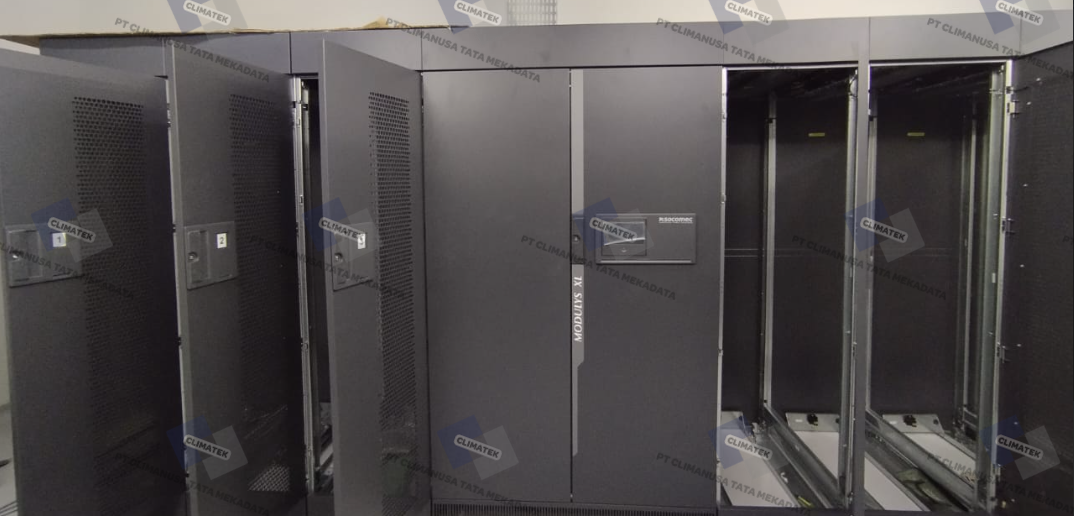Amidst the global shift toward renewable energy, data centers play a crucial role in supporting sustainability. Their high energy consumption requires operators to adopt modern technologies to improve power efficiency, reduce carbon emissions, and tackle challenges of integrating renewable energy. As a Distributor Modular UPS Indonesia, Climanusa delivers advanced solutions to help data centers navigate these significant changes in the global energy landscape.
Why Is Energy Transition Important for Data Centers?
The global energy transition is triggering significant changes in how energy is generated, stored, and managed. Research shows that electricity, transport, and building sectors will transition to renewable sources, reaching 90% by 2040. Within this context, data centers must become part of a smarter and more sustainable energy ecosystem, with key benefits such as:
- Carbon Emission Reduction: Aligning with ESG targets and contributing to net-zero.
- Cost Efficiency: Modular technology minimizes power wastage, driving operational savings.
- Operational Reliability: Utilizing smart technologies to monitor and manage power in real-time.
Key Challenges in Energy Transition
1. Variability of Renewable Energy
Renewable sources like solar and wind are inherently unstable, necessitating advanced storage and distribution technologies to maintain power stability.
2. Grid Integration
Electrification of transport, buildings, and industries adds load to the grid, creating challenges like power congestion and grid instability.
3. Legacy Infrastructure Management
Many data centers still operate on traditional power infrastructure that doesn’t support modern technology integration.
Climanusa Solutions for Sustainable Data Centers
1. Modular UPS for Flexibility and Efficiency
Modular UPS allows operators to scale power capacity according to operational needs, offering:
- High Efficiency: Minimizes power losses with up to 97% efficiency.
- Modular Redundancy: Provides cost-effective scalability options.
2. Energy Storage and Grid Stability
Integrating Lithium-Ion batteries and modular energy storage systems to support the grid with:
- Frequency Stabilization: Maintaining grid stability during peak loads.
- Surplus Energy Utilization: Storing excess energy from renewable sources for high-demand periods.
3. Digitalization Technology for Real-Time Monitoring
AI-based software analyzes power usage and predicts future energy needs, enabling:
- Energy Optimization: Reducing power waste and operational costs.
- Early Anomaly Detection: Avoiding downtime through predictive maintenance.
Implementation Steps for Data Centers in Indonesia
- Energy Audit: Assess current power consumption to identify upgrade requirements.
- Modular System Integration: Install Modular UPS and energy storage to ensure operational flexibility.
- Operational Team Training: Train staff to manage and monitor modern technologies.
- Continuous Monitoring: Use analytics software to oversee power performance in real-time.
Benefits of Climanusa Solutions
- Reduced Operational Costs: Power optimization reduces energy consumption by up to 20%.
- Environmental Sustainability: Supports ESG targets with eco-friendly technologies.
- Enhanced Reliability: Modular technology ensures uninterrupted power availability.
- Faster ROI: Operational savings accelerate return on investment.
Conclusion: The Future of Data Centers in the Energy Transition Era
Energy transition is an inevitable step for modern data centers. By adopting modular technologies, digitalization, and renewable energy integration, data center operators can ensure long-term efficiency, sustainability, and reliability. As a Distributor Modular UPS Indonesia, Climanusa is your trusted partner in building a greener and more efficient future for Indonesia’s data centers.
Climanusa is your trusted partner for modular UPS solutions and data center energy efficiency, supporting sustainability across Indonesia.
For more information, please click here.
–A.M.G–

